Engineering’s Undergraduate Research Office Encourages Undergrads to Experience Research
April 25, 2018
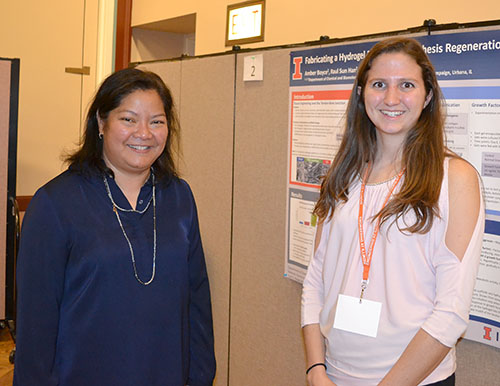
Tasha Mamaril (left) with ISUR scholar Amber Boyce at the 2018 ISUR Poster Expo.
Tasha Mamaril has her finger on the pulse of research for Engineering undergrads. As the Coordinator of Engineering’s Undergraduate Research Office, she provides information to engineering students about what kinds of opportunities are available. Plus, she oversees two of the college's research programs specifically for undergrads: MUSE (Mentoring Undergraduates in Science and Engineering) and the Illinois Scholars Undergraduate Research (ISUR) program, which provides scholarships for students addressing research related to the interests of the corporations which fund the program.
In a recent survey, almost half (46.7%) of Engineering’s undergraduate students participated in research this past year, whether here on campus with a faculty research group, in an internship, or in a senior thesis or capstone project. And for engineering students interested in participating in research, Mamaril and her office can be a valuable resource.
However, when it comes to connecting students with researchers here on campus, Mamaril stresses that she doesn’t hold students’ hands.
“One of my duties is to get them information about which professors are doing what. That's how I arrange things. I don't want to hand hold students. We try to give them that independence. Have them think about what they want.”
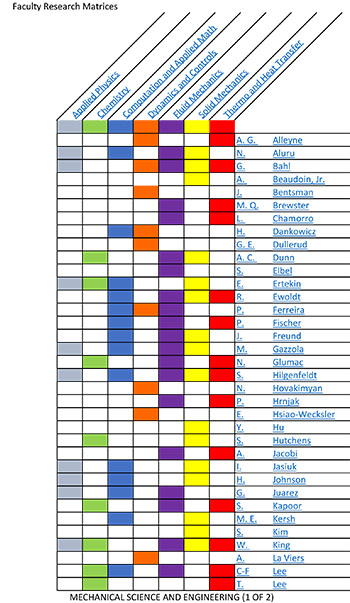
The research interests matrix for the MechSE department faculty.
But she admits that sometimes she does hold “therapy sessions." “We try to hash out, ‘What is it that you're passionate about? What's your interest? Where are you looking in terms of your career right now?’ So that's what I do.”
To steer students in the right direction in their search for a research experience that closely aligns to their interests, Mamaril and her staff have developed a database comprised of matrices detailing research interests for all faculty based on the primary research areas in each of Engineering’s twelve departments. Then, it’s up to the students to discover which professor's research excites them.
And while all faculty in a given department appear on the matrix, that doesn’t necessarily mean a professor has agreed to sponsor undergrad researchers in his or her lab. Students just might have to convince them that they’re right for the job. “Just like any job,” Mamaril explains, “they have to go out there, contact professors, ask them for opportunities to work in their research.”
But given the large percentage of engineering undergrads doing research, it appears that a large number of the researchers do take a chance on undergrads. In fact, Mamaril states, “I think the culture of the college has grown to be very supportive of undergraduate research.”
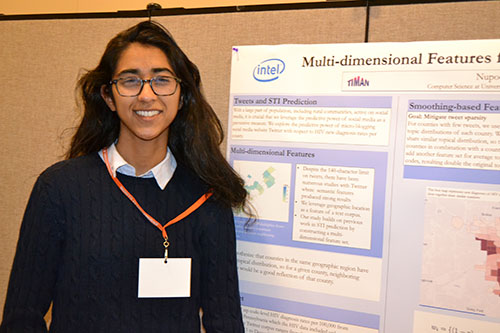 Nupoor Gandhi with her poster at the ISUR poster session. Nupoor participated in both the MUSE program as well as the ISUR program.
Nupoor Gandhi with her poster at the ISUR poster session. Nupoor participated in both the MUSE program as well as the ISUR program. As proof of the positive college climate regarding undergraduate research, a number of grad students have chosen to bolster undergrad exposure to research via Mentoring Undergraduates in Science & Engineering (MUSE). In its 3rd year, the program is run by Mamaril and Rhonda McElroy in Engineering’s Graduate Programs Office. Usually 20–30 undergrad students are being mentored by engineering grad students annually.
Another program Mamaril coordinates is Engineering’s Illinois Scholars Undergraduate Research (ISUR) program. In ISUR, participants do research related to the foci of the sponsoring corporations. Current ISUR research areas include: semiconductors, electronics, information technology, energy and the environment, chemical solutions, agricultural biotechnology, and health. Current ISUR sponsors include: the Semiconductor Research Corporation; Intel, Shell, Dow, John Deere, and Rockwell Collins.
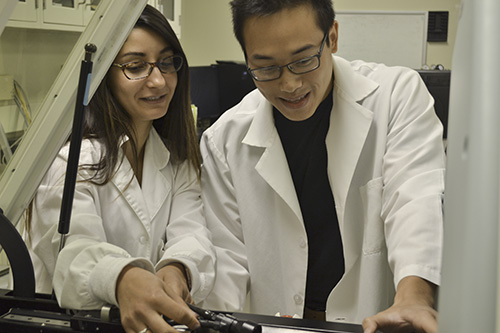
ISUR scholar Than Huynh (right) and his grad student mentor, Jamila Hedhli, at work in Professor Lawrence Dobrucki’s imaging lab.
In 2017–2018, ISUR provided scholarships for 36 participants, who conducted research in one of the above areas for two semesters.
How might an interested engineering undergrad become an ISUR scholar? It’s a bit of a process. For one, the program is not necessarily an incentive to entice students to get their feet wet in undergraduate research, but is more of an encouragement for those who have already done so. For instance, a student must first seek out a researcher in his/her area of interest, who, of course, must be willing to invest in the student. Next, the undergrad must be trained in the lab’s research until he or she becomes a contributing member of the lab.
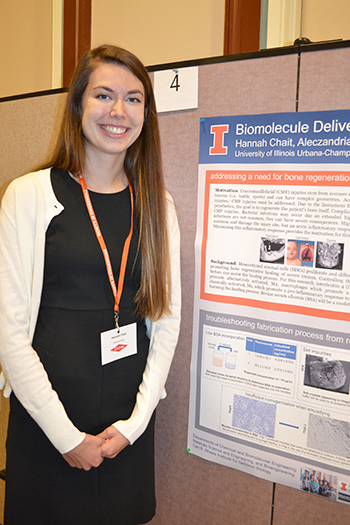
Hannah Chait with her poster at the 2018 ISUR poster session.
Another ISUR criterion is that only a student whose proposed research area dovetails with the program’s predetermined areas of research can be funded. For example, ISUR sponsors are very specific; they only support students who work on projects that fit their list of categories. So the office makes a general call for proposals through its website, listservs, departments, and undergraduate program directors or associate heads to help spread the word, announcing the specific areas on which ISUR research will focus.
Once a student has determined that his/her research aligns with an ISUR sponsor’s, the next step is to work with his or her graduate or faculty mentors to write a research proposal. This is now a requirement when one applies to the program. It wasn’t in the past, but by the time students had gotten into research groups and gained skills, the semester was already halfway over. So it was decided that the proposal should be an application requirement.
While research is a key component, ISUR is about more than just the research. In the fall, ISUR participants take an undergraduate research seminar class (for credit) comprised of lectures; panel discussions; and group activities, such as peer reviews or mock presentations. “We try to get students to feel what it's like to be a researcher by developing their communication skills,” Mamaril explains.
The goal of the class is to help students to be able to communicate about their research. Part of the process is the question, “If somebody were to ask you right now, what's your two-minute speech regarding your research interest?”
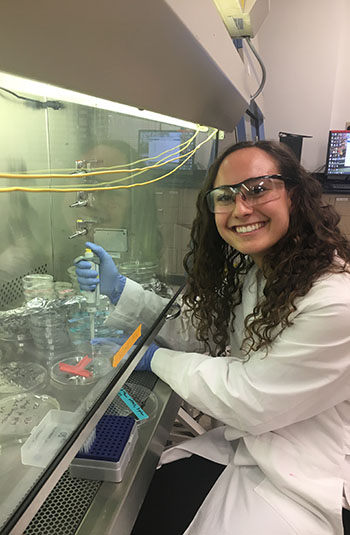
ISUR scholar Nicole Juguvich at work in Chemical Engineering Professor Ying Diao's Lab (photo courtesy of Nicole Juguvich).
“We want them to understand what they're doing,” she admits. “We don't want to be too technical about things. They understand in the beginning that science communication does not necessarily mean bombarding a person with all this jargon. We always try to exercise writing skills. They do technical summaries of articles, and they do a simplified literature review. So it's basically preparing them to understand the logical framework of research as well as training them as researchers who communicate their science.”
The need for the class is quite evident at the beginning of the semester when she asks students to tell the class about their research: “I always struggle with getting students to narrow down what their research is on,” Mamaril confesses. But the class evidently makes quite an impact on the students’ ability to communicate. “At the end, when you ask them again, it's completely different,” she relates.
According to Mamaril, the students prep the entire fall semester for the program’s poster expo in April, the culminating event of the year-long research experience. This year’s ISUR Poster Expo took place on Wednesday, April 18th, during which 26 of the 36 2017–2018 ISUR participants (ten graduated back in December) presented posters about the research they’ve been doing over the last year.
But the students’ ISUR research experience doesn’t have to end there; they're allowed to renew or continue participation in the program after their first two semesters. According to Mamaril, students who reapply either go deeper, focusing on another outcome or objective of their current project, or if their grad student or faculty mentor think they're ready, they might branch out into something new and actually do their own research project. She also cites rare cases where students who aren't sure what they want to do career wise might transfer to another research group in order to increase their experiences with different fields.
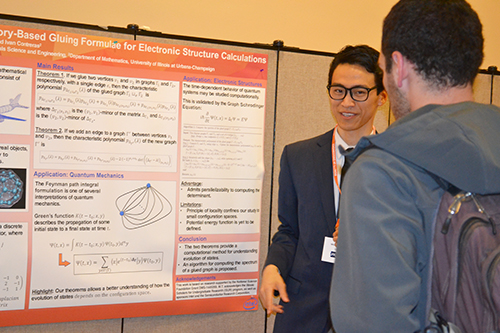
Michael Torlyama explains his poster to an onlooker at the 2018 ISUR poster session.
“I think undergraduate research experience has also helped clarify what they want to do as a career,” she adds. “And we’re hoping it's a STEM career!”
So why is it important for students to do research as undergrads?
According to Mamaril, undergrads usually do undergrad research because they intend to go on for a graduate degree. But she always tells students that research is beneficial nowadays even if they’re not going to grad school.
She cites her own experience. She got her bachelor's in chemical engineering and didn't immediately go to grad school. But she'd done a research project her senior year, so that helped her get a job in industry.
“Doing research is a way for you to develop so many skills,” she stresses, “not just technical skills or increasing your background knowledge in a specific field. But it's also about the soft skills you learn, the communication and presentations.”
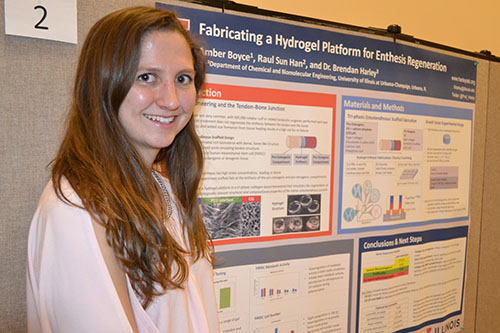
ISUR scholar Amber Boyce, a Chemical Engineering senior, presents her research at the ISUR Poster Expo.
But she also stresses that for undergrads set on grad school, it's "a very good thing to have on your curriculum vitae,” she says, “Because it's becoming more and more competitive to get into graduate programs, especially top-ranked ones. They're looking at so many amazing students with 4.0 GPAs. What's the difference? The experiences.”
She adds that a research experience is also helpful when job hunting. According to Mamaril, during a job interview, when students are asked, "What's the most interesting thing you'’ve done so far?" they’re glad if they can report, “undergraduate research,” because they've been through it, and find that it’s a topic of conversation that they can easily talk about. “It also tells employers that they have time management skills and the ability to do an independent project with structure and procedures,” she adds. "These are things we actually measure also in our program.”
Regarding other benefits of undergraduate research, Mamaril reports that, on a learning outcomes assessment her office administers, participants reported that the research had helped them develop their writing skills or other things employers look at.
“You may be really smart,” says Mamaril, “but can you talk to me or write about it? Those are some of the things that we try to tell them. We try to tell them that undergraduate research is overall not just a technical skill development experience, but it's an educational enhancement in a way.”
Story and photographs by Elizabeth Innes, Communications Specialist, I-STEM Education Initiative.
More: Engineering, Undergrad, Undergrad Research Symposium, 2018
For more I-STEM articles about Engineering Undergraduate Research, see:













.jpg)
















